Have you ever been so deeply involved in something that you lost all sense of time? How did you feel in this moment?
It happens to me all the time, often when I’m writing blog posts like this late into the night. Oops, it’s 2 am. How did it get to be so late? Or when I’m building or painting something that requires my focus and attention. Maybe it happens to you when you’re training for a big run or when you’re baking your favorite recipes. It’s a great feeling, right? You lose all sense of yourself and probably create something incredible that amazes even you. And maybe you thought, “really, did I make that?”
And guess what…this happens to kids as well.
When I pay attention to what my children are interested in and how they get wholly absorbed in meaningful activities (pouring and mixing water in the bath, imaginative play in forts, or mastering a drawing game, below), I notice that these moments happen all the time. At the root of these moments are the elements of curiosity, exploration, and imagination.
I recently facilitated a cloud dough station at my daughter’s nursery school. A handful of children surrounded the table, asking good questions., squishing dough in their hands, and laughing. One of the boys who arrived at the table late couldn’t keep his hands off the dough; it reminded him of snow. He was captivated by the feel of it and stayed rooted at that table, running his fingers through the silky dough and enjoying the phenomena of its texture. Witnessing this enthrallment in a child other than my own reminded me of the growth, comfort, and exploration that children can find through meaningful hands-on experiences.
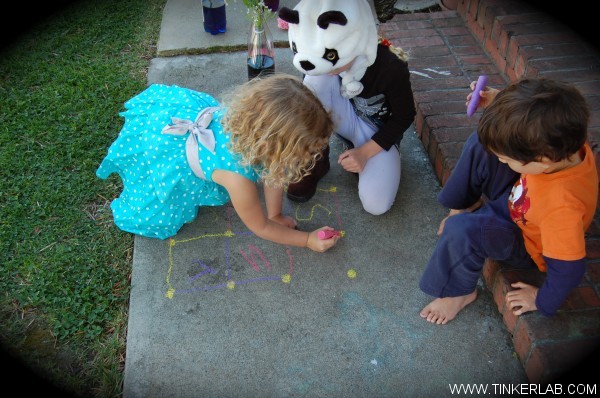
Watching young children engage deeply in an activity (some to the point that they stopped talking and forget that the world is moving around them) made me think of the concept of flow, coined by psychologist Mihaly Csikszentmihalyi in his seminal book, Flow: The Psychology of Optimal Experience.
The idea, simply, is that people are happiest when they’re deeply absorbed by whatever they’re doing. In a 1996 Wired Magazine article, Csikszentmihalyi explained flow as…
“being completely involved in an activity for its own sake. The ego falls away. Time flies. Every action, movement, and thought follows inevitably from the previous one, like playing jazz. Your whole being is involved, and you’re using your skills to the utmost.”
In his books, Csikszentmihalyi explains that reaching a true state of flow can takes years of experience and practice, but you can see moments of it in children of all ages, learning how to focus their attention by exploring the things that they’re passionate about. Have you seen these moments in your own children or students?
An interesting point to note about flow is that it can’t happen if the task is too easy. If the child (or adult) isn’t challenged to test their new skills, they become bored. You’ve witnessed this transition away from flow if you’ve ever tried setting up a “favorite” activity, only to find your child is no longer interested in it.
In the photos I’m sharing here, my daughter just learned the dots and boxes game, and wants to keep at it (over multiple days) to figure it out and test her knowledge. She’s in a state of 3-year-old flow. But as soon as she’s mastered the game or feels like it’s too simple, she’ll no longer be in that state.
I’d love to hear about your own observations of flow, either with yourself or your children. Can you think of a time that you experienced this? And what about your children?
And if you can’t think of any off the bat, I’d like to challenge you to look for these moments over the next few days. Take some notes and report back with your discoveries.

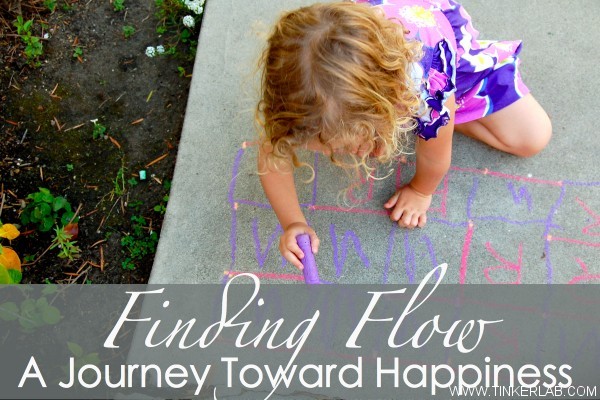
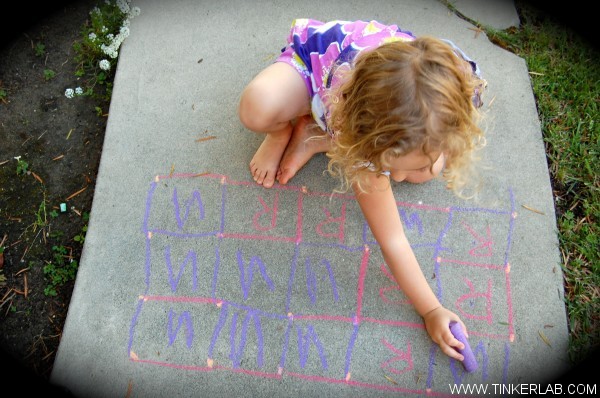

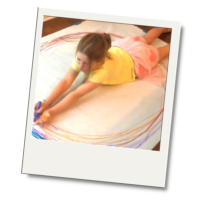
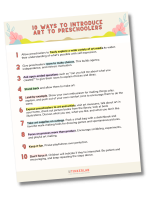
big ups to chick-sent-me-high! (i’m a fan, too: https://www.paintcutpaste.com/in-the-flow/) i love this post, rachelle… and the insight about how there needs to be some degree of challenge because once there is total mastery, this degree of absorption doesn’t happen. i need to find more space for the flow to arise in my world right now. thanks for that challenge and reminder.
I’m so glad you shared the link, Jen. Right — there has to be an element of challenge or else we lose all interest. The same holds true for kids and adults. I need to find more space too…another challenge 🙂
I really enjoyed reading this. When I get so caught up in something I even forget to eat! It’s made me realize how much my daughter is like me in this regard. She has shown such intense concentration (since she was about 2) I had her hearing checked. She just goes to her own world where nothing else matters. I’ve been told she has a “strong sense of fantasy” this is something I hope NEVER changes.
Wow — that’s fascinating that your daughter’s focus was so intent that had her hearing checked! It’s interesting to think that this skill runs in families. It’s a gift that she can take with her anywhere she goes.
What a great post, connecting finding flow with childhood. It’s been a while since I read about “finding flow” but I spend a lot of time searching it out, art and writing and reading are my favorite ways, but there are many other activities/challenges that can work. It’s a good idea to watch kids and take a hint from them on finding flow, and it’s a good idea to use flow to help your children learn and be happy people.
Thanks for the great comment, Rowena. You’re right — flow can come through any number of activities. A while back I spent a week documenting my older child’s passions and maybe it’s time to revisit that experiment.
Very interesting read. I had not thought about this, but upon reading, could recall several moments where my daughter has found a state of flow. This happens particularly when she is creating.
It usually happens when I’m creating too, Crystal, and I suppose it’s different for everyone. Thanks for the comment 🙂
So funny that I read this post today! I haven’t thought about “flow” since my days in grad school, but today I did. My son was so engrossed in his Legos that I felt bad to disrupt him to go to piano lessons. I love when I see my children in a state of flow, enjoying their play and ignoring the rest of the world!
I am training as a Montessori teacher so I am reading her books a lot lately. Maria Montessori also observed the same concentration with children during their sensitive periods (during those periods when they are most capable to learn a subject) It is sch a joy to watch a child totally absorbed in her activity. I love your post 🙂
Thank You for the reminder of how Flow and Happiness are connected. I regret not remembering when my children experienced flow. I didn’t realize what it was at the time.
Now I watch my grandchildren with wonder. The eldest grandchild, 8 yo boy, gets lost in books, video games, and Lego’s. He has also been diagnosed as AD because he gets distracted extremely easily unless he is in the Flow. I found out that they consider hyper-focus an aspect of AD. I am so happy that my daughter rejected medication for him. I’m afraid of what that would do to his experiencing Flow and happiness.
[…] 育児サイトTinkerLabの設立者であるRachelle Doorleyさんは、作業が簡単すぎると子どもは没頭した状態にはならないと言います。 […]
[…] individuals of us with little ones, gurus recommend trying to uncover circulation as a family members. The kids and I coloration together, paint, and […]
[…] those of us with children, experts recommend trying to find flow as a family. The kids and I color together, paint, and play with modeling clay. […]
[…] these of us with youngsters, specialists recommend looking for circulate as a household. The youngsters and I coloration collectively, paint, and play […]
[…] those of us with children, experts recommend trying to find flow as a family. The kids and I color together, paint, and play with modeling clay. […]
[…] all those of us with children, gurus propose trying to discover movement as a household. The kids and I colour alongside one another, paint, and […]
[…] those of us with children, experts recommend trying to find flow as a family. The kids and I color together, paint, and play with modeling clay. […]
[…] those of us with children, experts recommend trying to find flow as a family. The kids and I color together, paint, and play with modeling clay. […]
[…] those of us with children, experts recommend trying to find flow as a family. The kids and I color together, paint, and play with modeling clay. […]